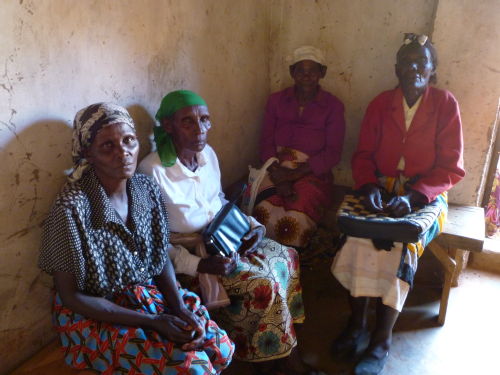Caring for older people in Kenya: research workshop to affect policy
- Improving the care of older people, particularly women, in Kenya - and exploring how the state can better recognise and support unpaid or undervalued care work in the country - is the focus of an international workshop in Nairobi this month, sponsored by the University of Warwick
- Event will bring together African and international researchers, policy-makers and civil organisations to discuss how Kenyans who give and receive care should be recognised and protected by law
- Participants to discuss how community practices – like woman-to-woman marriage – are used presently to provide security and care for older persons and what policy makers might learn from these
- Policies to be drafted – and workshop set to enhance judicial decision-making on care issues to implement United Nations’ Sustainable Development Goal 5 (Gender Equality) Target 4 (Recognise and value unpaid care work) in Kenya & East Africa
Improving the care of older people, particularly women, in Kenya - and exploring how the state can better recognise and support unpaid or undervalued care work in the country - is the focus of an international workshop taking place in Nairobi this month, sponsored by the University of Warwick.
![Older woman and younger woman in a woman-to-woman marriage with Ann Stewart [left] - credit Professor Stewart/University of Warwick ann1](older_woman_and_younger_woman_in_a_wtw_customary_marriage__with_ann_-_nandi_community_edited.jpg)
The event – ‘Care, Work and Property: How is Care Labour Valued?’ - will bring together African and international researchers, policy-makers and civil organisations to discuss how those who give and receive care should be recognised and protected by the law.
Organiser Professor Ann Stewart (Warwick Law School) will disseminate her Leverhulme Trust-funded research on woman-to-woman marriage, in which an older woman, typically without sons, can socially and legally marry a younger woman, whose children become children of the older woman’s lineage. Woman-to-woman marriage provides a legal framework for the longer-term care of both women. The younger woman takes care of the older woman during her life time but along with the children to the marriage inherits the older woman’s assets.
Professor Stewart explores how this arrangement - which is recognised not only as a legitimate customary practice but also in the Kenyan courts - is being used to ensure the provision of care for older people in rural areas where most of the country’s older people live. She however highlights the problem of relying too much on women to do the job of caring for a rapidly ageing population, a concern recognised in the 2016 United Nations’ Sustainable Development Goals, which calls on governments to provide sufficient social protection measures to lift the burden from carers.
She will share her findings at the workshop, discussing how community practice can work to provide long-term care, and suggesting that policy-makers need to take account of existing community practices and their capacity to adapt if appropriately supported by legal protections for those involved in providing care to secure a sustainable life course approach to ageing.
The workshop aims to produce draft policy briefs targeted at specific audiences to enhance gender-sensitive policy making and judicial decision-making on issues relating to care and to develop measures to implement the United Nations’ Sustainable Development Goal 5 (Gender Equality) Target 4 (Recognise and value unpaid care work) in Kenya and Eastern Africa.

Life for older people in Kenya – and for women, in particular – is made harder by a lack of state welfare provision, a shortage of land and labour to provide subsistence, and distribution of family property through traditional kinship systems.
Older people in Kenya often have the responsibility of care (for example, providing primary care for orphans of HIV/AIDS), whilst not being cared for themselves.
The entire planet is experiencing ageing populations, and projections suggest Sub-Saharan Africa will see a rise from 32 million older people (aged 60+) in 2008 to 212 million in 2050.
Notes to editors:
The workshop is funded by the University of Warwick, and supported by HelpAge International, the National Gender Equality Commission of Kenya and the Kenya National Commission on Human Rights.
‘Care, Work and Property: How is Care Labour Valued?’ is taking place 12-13 Sept 2017 at the British Institute in East Africa (BIEA), Laikipia Road, Kileleshwa, Nairobi, Kenya.
Image 1: Older woman and younger woman in a woman-to-woman marriage with Ann Stewart [left] - credit Professor Stewart/University of Warwick
Image 2: Older women (husbands) in woman-to-woman marriages - credit Professor Stewart/University of Warwick
Further information, contact:
Luke Walton, International Press Officer
+44 (0) 7824 540 863
+44 (0) 2476 150 868
L dot Walton dot 1 at warwick dot ac dot uk
